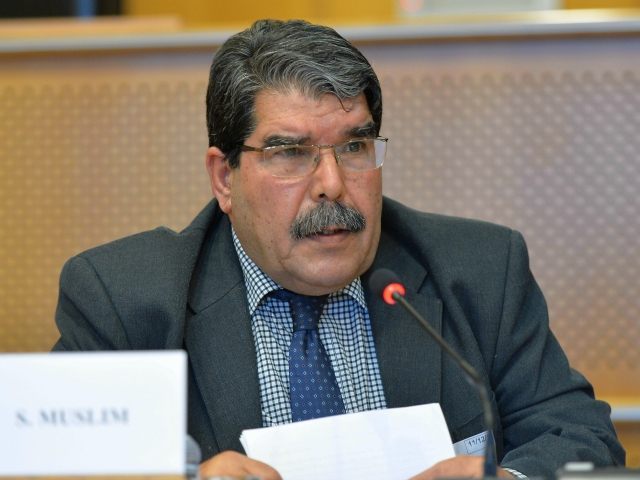Kurdish leader Saleh Muslim argued this week that the overthrow of Bashar Assad’s brutal regime in Syria would be a disaster for the entire world.
As the UK Independent reports, Muslim and the Kurds he represents were originally in favor of taking Assad out of power, but that was before the rise of ISIS. He was not willing to forget how badly Assad’s government treated the Kurds but said the new enemy in Syria was far worse. He described the threat posed by ISIS and other Islamist militants to the capital of Damascus as a “dangerous” situation.
Muslim mentioned recent incidents where his forces and Assad’s troops were both attacked by ISIS, making them allies of convenience on the battlefield. It follows that if ISIS delivers a knockout blow to Assad and takes his troops off the field, the Kurds are not in a good position to handle sustained attack from Islamist forces. It is difficult to see a scenario where Assad falls and the Islamic State does not conquer most of Syria.
The Kurdish leader also mentioned tensions with Turkey, which is often accused of fearing the Kurds—and the possible emergence of an independent Kurdish nation sprawling from Iraq to Turkey—more than it worries about the Islamic State.
Turkey is currently engaged in police and military action against insurgents from the Kurdistan Workers’ Party (PKK), which is more closely linked to the Syrian Kurdish Democratic Union Party, which Saleh Muslim presides over, than Western strategic planners like to contemplate. Muslim accused the Turks of effectively, if inadvertently, helping ISIS by attacking PKK units in northern Iraq that were actually fighting the Islamic State.
Turkey’s hostility is making a tough job even harder for the Kurds, who wish to protect everyone in Syria from ISIS—but if they expand their territory any more, or continue opening lines of supply with far-flung Kurdish villages under attack from the Islamic State, the Turks will start getting nervous about the incipient birth of Greater Kurdistan again. Muslim also thought Turkish opposition was preventing the United States from giving more weapons, ammunition, and air cover to Kurdish ground forces.
Interestingly, there is some tension between different Kurdish groups over whether a new Kurdish state might form and who would be in charge of it. The Independent mentions the rival Kurdistan Regional Government of Iraq, which is actually nervous enough about the territory controlled by Syrian Kurds to periodically embargo shipments of supplies to them.
Another harsh reality the Obama administration would rather ignore emerged from the interview with Muslim: “The Syrian armed opposition is almost wholly dominated by Isis and its al-Qaeda equivalents.” The eternal quest for “moderate Syrian rebels” looks painfully futile in that light, and it raises further concerns about bringing tens of thousands of Syrian refugees into the United States. The Kurds are really all we’ve got in Syria, and the complex political situation means we can only help them so much.
As for the entry of Russian troops and warplanes into the Syrian theater, Saleh Muslim was surprisingly dismissive of their impact, referencing month-old assurances from a Russian envoy that “they would not be involved in the fighting.” Things certainly do seem to be moving in the direction of Russia taking the field in a big way, but even if they didn’t, the presence of so much Russian firepower in Damascus is basically insurance that the city will not fall.
Muslim was determined to wipe ISIS, which he referred to as “Daesh,” out to the last man. “Our main goal is the defeat of Daesh,” he said. “We would not feel safe in our homes so long as there is one Daesh left alive.” He added that al-Qaeda groups like the Nusra Front and Ahrar al-Sham “have the same mentality,” so presumably he wants them defeated, too.
But as for the future of Syria, once the terror gangs have been routed, he called for a “political solution,” because “no side can finish off the other.” That means Assad will most likely remain, perhaps after making promises about the treatment of the Kurds and other minorities in Syria, such as the Assyrian Christians.
With Russia and Iran behind him, Assad will be in a strong position to work out an arrangement like that and emerge the victor in a long and bloody civil war, in which he deployed weapons of mass destruction against his own people. The Kurds will never love him, but it sounds like they can live with him after they finish the grueling task of defeating both ISIS and al-Qaeda.

COMMENTS
Please let us know if you're having issues with commenting.